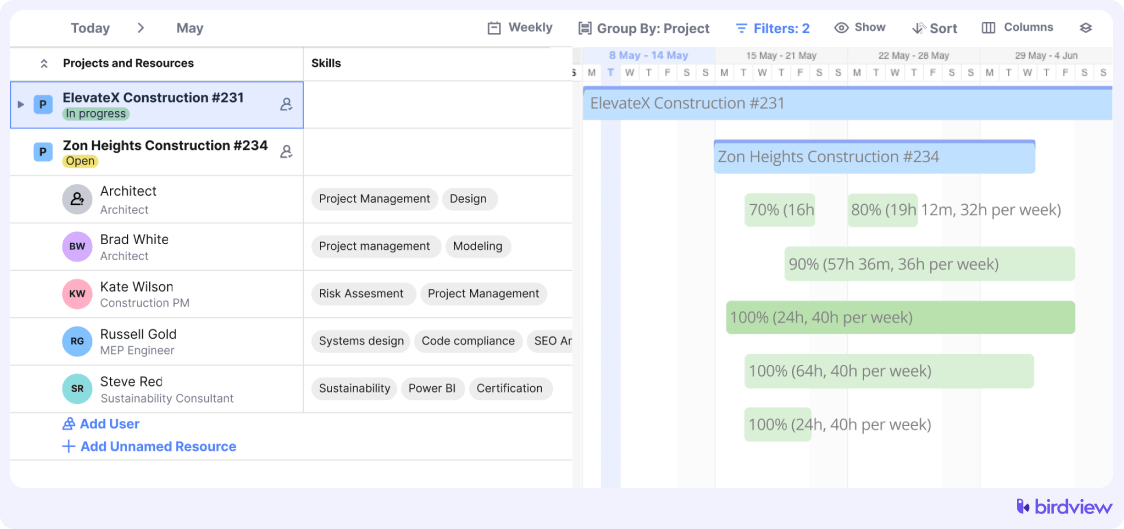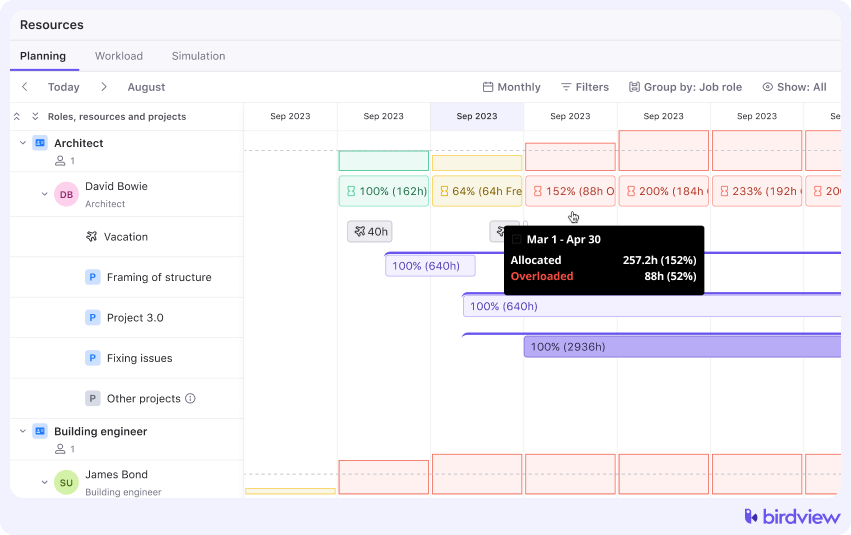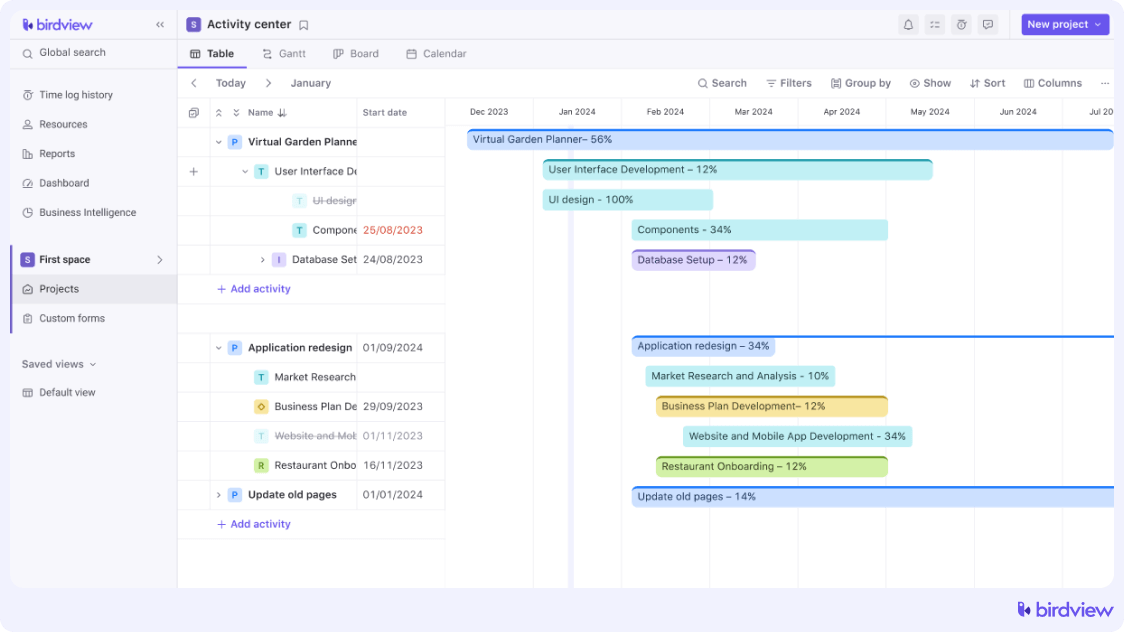Effective project management hinges on two critical skills: resource allocation and task scheduling. Together, these elements form the foundation of any successful project.
Yet, balancing these aspects can be challenging, especially as projects multiply and resources become limited. This article explores the essentials of resource allocation and task scheduling, providing clear, practical advice for project managers. Whether you’re overseeing a single project or managing multiple initiatives, mastering these skills is key to keeping your projects on track and within budget.
What is resource allocation?
Resource allocation in task management is the assignment and management of resources to perform specific activities or tasks within a project.
This process is necessary for the optimal allocation of personnel, time, and other resources to achieve the goals associated with the tasks. Resource allocations include:
- Personnel Assignment: Assigning people with appropriate skills. This ensures that tasks are completed by team members with the required capabilities.
- Time management: allocation of time resources based on task priorities and deadlines.

- Budgeting: managing the financial resources associated with completing tasks. This includes budgeting for any costs associated with paying team members and other costs necessary to complete the task.
- Workload balancing: Distributing tasks among team members to prevent individual team members from being overloaded or underutilized. Workload balancing is the most complex procedure for more efficient task execution.

- Risk management: Anticipating and addressing potential risks associated with allocating resources to tasks. This includes planning for unexpected delays, resource shortages, or changes in task requirements.
- Prioritization: Determining the order in which tasks should be completed based on their importance, dependencies, and critical path. This ensures that high-priority tasks are addressed first.
- Team Collaboration: Maintain communication between team members and clients regarding the availability of resources and their costs included in the resource allocation plan to manage tasks.
Effective resource allocation helps optimize the use of resources and successfully complete tasks within the project’s time and budget. Project managers play a key role in monitoring and adjusting the allocation of resources throughout the project life cycle.
What is task scheduling?
Task scheduling is the process of organizing and assigning specific tasks within a project to team members, setting deadlines, and determining the order in which these tasks should be completed. The primary goal of task scheduling is to ensure that project activities are completed in a timely, efficient, and organized manner, aligning with the overall project timeline and objectives.
Effective task scheduling involves several key steps:
- Identifying tasks: Breaking down the project into manageable tasks or activities that need to be completed.
- Determining dependencies: Understanding the relationships between tasks, including which tasks need to be completed before others can start. This is crucial for identifying the critical path of the project.

- Setting priorities: Assigning priority levels to tasks based on their importance and urgency, ensuring that the most critical tasks are completed first.
- Allocating resources: Assigning the appropriate resources (e.g., team members, time, tools) to each task based on availability and skillsets.
- Establishing timelines: Setting start and end dates for each task, taking into account any dependencies and the availability of resources.
- Monitoring progress: Continuously tracking the progress of tasks, making adjustments as needed to ensure that the project stays on schedule.
Resource allocation vs task scheduling
Resource allocation and task scheduling are two interrelated yet distinct aspects of project management. While they both play crucial roles in ensuring the successful completion of a project, they focus on different elements of the project planning process.
Resource Allocation involves the strategic assignment of available resources–such as personnel, budget, equipment, and time–to various tasks within a project. The goal of resource allocation is to optimize the use of these resources to achieve project goals while minimizing waste and inefficiencies. Effective resource allocation ensures that the right resources are available at the right time to complete tasks without overloading or underutilizing any team members or other resources.
Task Scheduling, on the other hand, focuses on organizing and sequencing the tasks that need to be completed within a project. It involves setting start and end dates for each task, determining dependencies between tasks, and ensuring that tasks are completed in a logical order to meet the project‘s deadlines. Task scheduling provides a timeline for the project, helping to manage time effectively and ensure that tasks are completed on time.
| Aspect | Resource Allocation | Task Scheduling |
| Focus | The what and who–what resources are needed and who will perform the tasks. | The when and how–when tasks will be completed and how they fit into the overall project timeline. |
| Objective | Ensure resources are used efficiently across all project activities. | Create a timeline that ensures tasks are completed in the correct sequence and within the project‘s timeframe. |
| Interdependence | Resource Allocation affects Task Scheduling by influencing when tasks can be scheduled based on resource availability. | Task Scheduling impacts Resource Allocation by determining how resources should be distributed over time to meet deadlines. |
The role of a project manager in resource allocation and task scheduling
As a project manager, one of your primary goals is to succeed with effective resource management and task scheduling. Seems pretty simple: you know how many resources you have, the budget, and the time for the project. Just need to split the tasks among team members and define deadlines. Piece of cake.
As always, I am here to argue with that.
Resource allocation is easy. Smart, effective resource scheduling is damn hard. Why? I will tell you.. Why? I will tell you.
First of all, let‘s get to know some definitions. (If you already know these, just bear with me for a minute)
-
Resource planning and allocation is the process of distributing available resources to various activities.
-
Resource over-commitment is the process of assigning a specific resource (usually human) to a task that cannot be completed during a specific deadline. (For example, you assign one of your employees a task to complete in one week, but it‘s physically impossible to manage that during the 40 hours of the working week. The employee will have to stay overtime in order to finish the task).
-
Resource under commitment is the process of assigning a specific resource (usually human) with a task that can be completed sooner than the deadline.
-
Resource overallocation is the process when a specific resource (usually human or budget) is assigned to too many projects at once and cannot bear with the amount of it (for example, you have a team member working on 4 or 5 different projects at once, or you have set a specific budget for 4 or 5 different projects that are insufficient for completion of them all).
-
Resource underallocation is the process when a specific resource (usually human or budget) is assigned to fewer projects than its capacity.
So what does all of this mean to project managers? While it‘s easy to allocate resources for a single project, with the number of projects increasing your resources (time, human power, and budget mainly) stay the same. This is where it becomes super tricky to manage everything correctly.
Over-commitment and over-allocation can lead to various problems including missed deadlines, sloppy work, decrease in work quality, poor performance, productivity and motivation decrease, stress, and more unpleasant stuff like that.

Be at rest
Now let me relieve you guys a bit: It‘s technically impossible to allocate and schedule every single task and resource 100% correctly from the start. So what you will need to do is plan your actions as close to perfectly as possible in the beginning (taking into account all the ongoing projects, the number of tasks per employee also time needed to complete these tasks, the individual skills of each team member and all the other small details that you can think of) and make all the necessary shifts accordingly, real time.
You may wonder why is it impossible to allocate and schedule everything right from the start: If you are really good, you can pull that off. Well, not exactly. It doesn‘t depend on your godlike planning skills only.
Task scheduling usually consists of activities and resources and also different interrelationships between those. Each activity may have an unknown beginning, progress time, and end depending on the nature of the activity. This happens because some activities may start only after others finish. This relationship is called temporal constraint and is one of the reasons that cause difficulties.
The other reason is that all activities require a certain amount of resources to complete and you can‘t be 100% percent sure how much resource will each activity require. Also, activities use or generate resources as a result of completion (for example your lead nurturing program can help close a few accounts and add some money to your budget). This kind of relationship is defined as requirement constraints.
Those relationships between activities and resources show why proper allocation cannot be done right from the bat: you simply don‘t know all the outcomes.
How to allocate your resources smartly
Okay, knowing all this is very good, but how do you deal with the problem? Well, it‘s really up to you. That‘s why you are the project manager: you need to be smart enough to deal with the problems that arise in the midst of the project. Otherwise, your expertise and knowledge don‘t really matter, right?
Here are a few tips that can be used for most case scenarios to prevent incorrect resource allocation:
-
Distribute tasks smartly – Distributing tasks evenly among your team members isn‘t a good idea. While they may be all equally qualified for the job, individual skills should never be neglected. Some people excel at some tasks (they do them really well and super-fast), while dramatically failing at others. Distributing tasks smartly, taking into account the individual strengths and weaknesses of your team members can help save a lot of trouble in the future.
-
Rethink your deadlines – In cases when there is a resource over commitment, the longer you delay rethinking the deadline, the worse it will be in the end. If a team member can‘t cope with the amount of work that needs to be done in a specific time, waiting for another day or two isn‘t going to change the outcome. The task will still get delayed and will mess up all of your planning even further. It‘s better to take the matter into your hands quickly or consider swapping tasks between team members.
-
Keep an eye on your resources available – They say all things are good in moderation. I say all things are good in documentation. Document all your expenditures and gains during all projects to keep track of your resources available at any given time. This will allow you to minimize the chance of making a wrong decision when allocating resources and scheduling tasks. Things like modern software can be of great help in this matter.
-
Try to have a buffer – This is somewhat hard to do, but generally, if you can have some buffer time saved up for each or at least some activities, you could end up in great shape. This is mostly impossible to pull off with short project deadlines, but if it‘s a longer one, it might be a good idea to utilize this idea. For example, if you need to complete a project in 1 year and 4 months, it might not make a huge difference if an extra week or two adds up to the whole thing. Discuss this with your clients and if they agree, the small buffer can become your best friend in dire situations.
These are general examples that can be applied to most projects, but for each individual case, you will need an individual approach. Like all people are different on our planet, different PMs have different approaches and team members. You could decide to overwork your team with a promise and delivery of a significant bonus by the end of the project or take some more temporary workforce (like freelancers) to help you out. It‘s really up to you.
What‘s important is that you clearly understand that you can‘t be perfect constantly. Mistakes are inevitable and will happen from time to time. Minimizing the number of those mistakes and their effect on the project is what matters.



